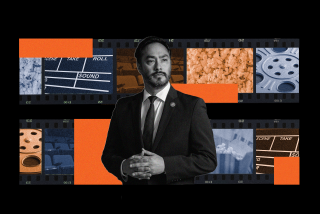Beatty Asks Congress for Labels on ‘Altered’ Films : Legislation: Actor-director joins two senators in supporting a bill to identify colorized and other modified movies.
- Share via
WASHINGTON — Actor Warren Beatty joined two U.S. senators Monday in calling for legislative action requiring labeling of all films that are “materially altered” without the creator’s permission.
Sen. Alan Simpson (R-Wyo.), one of the co-sponsors of the bill, said the legislation was needed to address the “tragedy” involved in colorizing classic movies such as “The Maltese Falcon” and “Casablanca.” He characterized these alterations as reprehensible and said that his bill would protect the “artistic integrity” of filmmakers by making audiences aware of colorization and other high-tech methods of altering film work, such as “time compression” and changing the soundtrack, “lexiconing.”
The Film Disclosure Act of 1992, which will be introduced today, requires that the labels must “describe the alteration and must indicate whether the film’s author, director, the screenwriter or cinematographer object to the alteration.”
Beatty, who received an Academy Award nomination as best actor in his latest film, “Bugsy,” addressed the Capitol gathering as a representative of the Directors Guild of America. In December, the guild launched the Artists Rights Foundation, which will work toward giving film artists the right to object to any tampering of their work.
“We are at a point in our social history where it is time for us to decide whether we want to take movies seriously as an art form or whether we want to allow the form and content of movies to be dictated by the marketplace,” Beatty said.
The proposed legislation was first introduced in the House last year by Rep. Robert Mrazek (D-N.Y.). The bill has drawn considerable criticism by the Committee for America’s Copyright Community (CACC), which represents 20 movie industry and media organizations (including The Times’ parent company, Times Mirror Co.).
In a letter of protest sent to the House Judiciary subcommittee on intellectual property and judicial administration, the CACC argued that the bill would “confuse consumers, discourage them from viewing a particular film and delay, if not prevent, the availability of certain motion pictures to the public.” The CACC called the legislation a “moral rights” bill, and said it would violate the First Amendment.
The real battle will begin on March 5, when hearings for the legislation will be held by Rep. William Hughes (D-N.J), chairman of the subcommittee.
Simpson, apparently trying to placate concerns of the movie industry, said that beyond the label requirement, “the bill does nothing more.” He said that the bill was a modified version of Mrazek’s bill, which sought to address some of the movie industry’s concerns; Simpson was not specific. The other co-sponsor of the bill, Sen. Howard Metzenbaum (D-Ohio), said that the integrity and authenticity of American films receive less protection in this country than anywhere in the world.
“Millions of Americans have now seen a colorized version of John Huston’s ‘Maltese Falcon.’ Yet few people know that Huston considered this treatment to be an act of defacement and mutilation,” he said.
“In Huston’s opinion, a computer ruined the tone, atmosphere and visual force of his film--and yet that version will forever be marketed and represented as his work.”
More to Read
The biggest entertainment stories
Get our big stories about Hollywood, film, television, music, arts, culture and more right in your inbox as soon as they publish.
You may occasionally receive promotional content from the Los Angeles Times.










